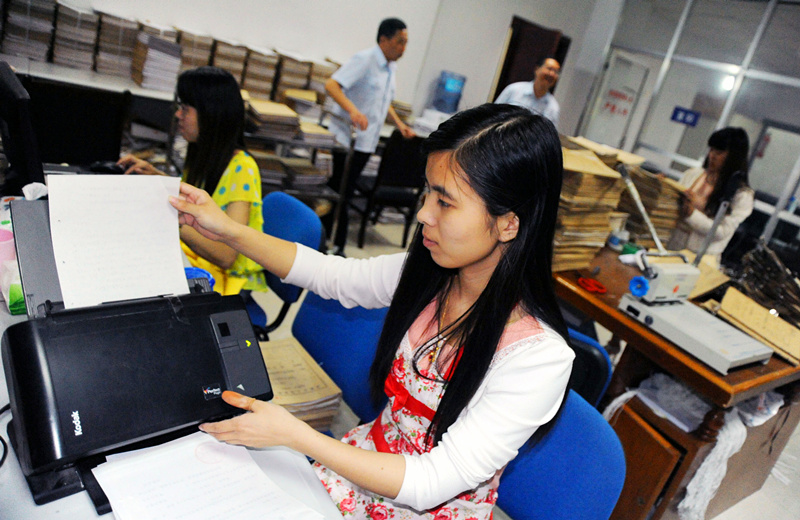Advancing digital archival management

A staff member scans documents for digitalizing archival resources at a local people’s court in Chongqing, to advance archival management and better serve the public.
On the occasion of International Archives Day, which this year fell on June 9, scholars discussed opportunities and challenges of archival management in the digital age.
In 2012, the quantity of digital archival resources nationwide reached 21.8 petabytes. In 2013, this figure increased by 22.4 percent to hit 26.8 petabytes, said Xu Shiping, deputy head of the State Archives Administration, at the International Conference on the Integration of Digital Archival Resources.
Built on official resources, China’s traditional archival management system has outwardly extended in the digital era.
“In the planned economy, the government possessed and managed all archival resources in political, economic, scientific, cultural and historical fields. However, more organizations and individuals have engaged in archival management in the market economy,” said An Xiaomi, a professor from the School of Information Resource Management at Renmin University of China. She added that every citizen should have the right to access open archival resources.
Tan Biyong, an associate professor from the School of History and Culture at Shandong University, said that advancing management of digital archival resources aims to maintain social records in the new era. Tan noted there are multiple models of digital archival resources management, including government-based, market-oriented and non-profit models. “The government-based model is able to quickly yield results but cannot preserve different types of digital resources related to organizations, social groups and families,” Tan said.
In addition, many scholars pay attention to the integration of digital resources to provide multiple services.
An said that the integration of digital archival resources is conducive to the advancement of national information governance, sustainable development of digital resources, coordinated innovation of public services and social information security. She recommended the integration of digital archival resources be incorporated into the national strategies for data resources management and utilization.
Wu Jianhua, a professor from the School of Information Management at Nanjing University, said that it requires an effective mechanism for digital archival resources integration.
Various provinces and municipalities have been steadily advancing digitization of archives. A large number of digital platforms, including the China Academic Library and Information System, the Digital Library of China and Chinese Government Public Information Online, have begun to integrate with each other, consolidating the foundation for building such a mechanism.
Elizabeth Klett, a senior executive from the Stockholm City Archives, Sweden, said that there should be no barriers to public information, and any person should have the right to use such information. Klett noted archives provide credible digital resources for the public.
In order to catch up with international trends, Chinese archival management has become more user-oriented. A service system for remote inquiry of archival resources has been established in Shanghai. People can search for different historical materials at nearby archives and community service centers. Shanghai is not the only city that provides such services. Many archive centers nationwide are able to provide online search services.
As social development progresses, archival resources become more familiar to the public. The general offices of the Central Committee of the Communist Party of China and the State Council have jointly released guidelines for accelerating and improving archival management and proposed the establishment of archival resources management systems that serve all people.
Feng Huiling, a professor from the School of Information Resource Management at Renmin University of China, said that the guidelines reflect modern society’s higher requirements for archival management.
Mao Li is a reporter at the Chinese Social Sciences Today.
